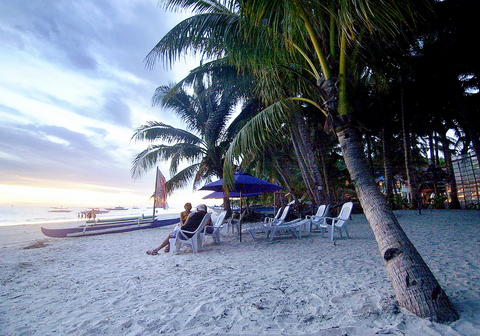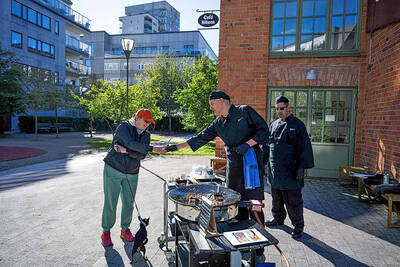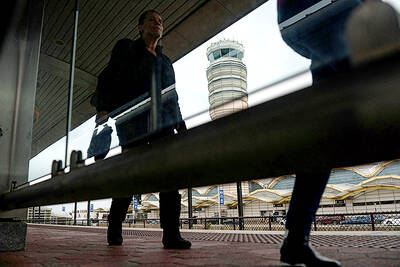Sketching a sunburst on the upper arm of a tourist sitting on the white sands of idyllic Boracay, tattoo artist Frederick Casilao admits his mind is more focussed on local property values.
"Before, a lot of people were interested in buying" beachfront acreage, says Casilao, whose family has a plot of land for sale. "Now, no one is."
To most people, this tiny island on the central Philippines is a tropical paradise, drawing nearly half a million visitors last year to its pristine beaches.

PHOTO: AFP
But a bitter dispute between the national government and thousands of local resort owners and residents could change all that.
The state has warned that as much as 90 percent of the 1,002-hectare island is not covered by land titles, meaning the government could sell off the land -- much of it occupied -- as it pleases.
This would put under a cloud the many millions of dollars invested in luxurious resorts for the wealthy as well as humbler establishments offering dormitory-style rooms to budget travellers.
Environment Secretary Michael Defensor, the government's point man in the Boracay land dispute that has now reached the Supreme Court, has become a hated figure in this island of 13,000 people.
"We don't know what will happen but people will fight through lawful means. This is land we're talking about. People will hang onto this. They are not letting anybody take it away," says Boracay Mayor Ciceron Cawaling.
Boracay residents have won a ruling from the appelate court, the country's second highest court, saying that they are entitled to own land on the island. Secretary Defensor has appealed the case to the Supreme Court, which still has to rule on the matter.
Defensor argues that the island's land ownership system must be formalized to enable investors to borrow money and to allow for better regulation of the expanding tourism industry here.
In early June hundreds of residents marched onto the streets of Boracay against Defensor. Even the local government of Boracay has taken an adversarial stance, issuing a position paper against the secretary.
"He cannot just take over the island. The people have invested blood and sweat on this island. We will fight to the last," says Anita Aguirre, a local who owns the Boracay Plaza Beach Resort.
There are over 300 registered businesses on the island, ranging from five-star country clubs to tiny shops and restaurants all catering to tourists, says the mayor.
About 458,000 tourists visited the island last year, at least 30 percent of them foreigners, says Cawaling, adding that he expects the number of tourists to hit half a million this year.
The national government collected 7.8 billion pesos (US$143.4 million) from taxes on Boracay tourist establishments last year, Cawaling points out, not counting local taxes and other indirect financial benefits.
Zoilo Anding, a special assistant to Defensor, has told resort owners the government aims to "provide security and stability to the people of Boracay through the issuance of land titles", and to "preserve the beauty of the island for future generations."
But to issue land titles most of the island must first be declared as "alienable and disposable land" which can then be sold off -- or in rare cases, granted to private individuals, Anding said.
However Boracay residents say the government's plan could result in their having to buy back land they already consider to be their own -- or worse, have it sold out from under them.
They charge that they are victims of a discriminatory policy imposed by then-dictator Ferdinand Marcos in 1978, six years after he had declared martial law.
Ironically, during a visit to the island, Marcos was so taken by its beauty that he declared Boracay and several other islands as special "tourist zones," preventing even the residents from getting titles to their lands.
Boracay largely remained undeveloped up to the mid-1980s, when a bloodless popular revolt in Manila ended Marcos' 20-year rule. While local and foreign tourists did travel to Boracay to lie on the white sands and swim in the crystal-clear waters, its facilities were threadbare: just wooden huts without electricity or telephone lines that attracted mainly hardy backpackers.
It was only in the late-1980s that the island really began taking off as a vacation spot. Upper-end hotels and resorts were set up and power, telephone and water connections were established with the nearby large island of Panay.
Orlando Sacay, a former member of the Marcos cabinet who sold his ancestral home and all his other assets elsewhere in the country to open a resort in Boracay seven years ago, is now one of the most vocal opponents of the government titling plan.
"We invested millions, we took a risk and we are the ones that made Boracay what it is," says Sacay, owner of the Waling-Waling Resort and vice-president of the Boracay Foundation, an advocacy group that is fighting the national government plan.
"The thought that you have to buy your land all over again is totally unacceptable to the people of Boracay," he adds.
The stances of the two opposing camps have hardened after some harsh exchanges in the Philippine media. Supporters of Defensor depicted the resort owners as landgrabbers who use government property for their personal profit.
They also accused the resort owners of bringing pollution, excessive garbage and overcrowding to the island through their alleged refusal to be regulated.
In return, some 4,000 Boracay residents signed a petition asking Congress to deny Defensor's confirmation as environment secretary.
Sacay and the other resort owners say they would prefer to wait for the Supreme Court to rule on the case -- a process that could take years.
Those will be years of uncertainty for Casilao, the tattoo artist, who says the national government's moves have scared away prospective buyers of his family's lot.

READINESS: According to a survey of 2,000 people, 86 percent of Swedes believe the country is worth defending in the event of a military attack Swedes are stocking up on food items in case of war, as more conflict in Europe no longer feels like a distant possibility, and authorities encourage measures to boost readiness. At a civil preparedness fair in southwest Stockholm, 71-year-old Sirkka Petrykowska said that she is taking the prospect of hostilities seriously and preparing as much as she can. “I have bought a camping stove. I have taken a course on preservation in an old-fashioned way, where you can preserve vegetables, meat and fruit that lasts for 30 years without a refrigerator,” Petrykowska said. “I’ve set aside blankets for warmth, I

FRUSTRATIONS: One in seven youths in China and Indonesia are unemployed, and many in the region are stuck in low-productivity jobs, the World Bank said Young people across Asia are struggling to find good jobs, with many stuck in low-productivity work that the World Bank said could strain social stability as frustrations fuel a global wave of youth-led protests. The bank highlighted a persistent gap between younger and more experienced workers across several Asian economies in a regional economic update released yesterday, noting that one in seven young people in China and Indonesia are unemployed. The share of people now vulnerable to falling into poverty is now larger than the middle class in most countries, it said. “The employment rate is generally high, but the young struggle to

ENERGY SHIFT: A report by Ember suggests it is possible for the world to wean off polluting sources of power, such as coal and gas, even as demand for electricity surges Worldwide solar and wind power generation has outpaced electricity demand this year, and for the first time on record, renewable energies combined generated more power than coal, a new analysis said. Global solar generation grew by a record 31 percent in the first half of the year, while wind generation grew 7.7 percent, according to the report by the energy think tank Ember, which was released after midnight yesterday. Solar and wind generation combined grew by more than 400 terawatt hours, which was more than the increase in overall global demand during the same period, it said. The findings suggest it is

IN THE AIR: With no compromise on the budget in sight, more air traffic controllers are calling in sick, which has led to an estimated 13,000 flight delays, the FAA said Concerns over flight delays and missed paychecks due to the US government shutdown escalated on Wednesday, as senators rejected yet another bid to end the standoff. Democrats voted for a sixth time to block a Republican stopgap funding measure to reopen government departments, keeping much of the federal workforce home or working without pay. With the shutdown in its eighth day, lines at airports were expected to grow amid increased absenteeism among security and safety staff at some of the country’s busiest hubs. Air traffic controllers — seen as “essential” public servants — are kept at work during government shutdowns, but higher numbers